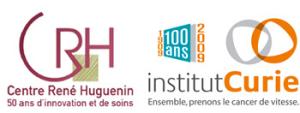Dose-Dense Methotrexate, Vinblastine, Doxorubicin, and Cisplatin With or Without Panitumumab in Patients With Advanced Urothelial Carcinoma: Multicenter, Randomized, French Unicancer GETUG/AFU 19 Study
Résumé
This study looked at whether epidermal growth factor receptor inhibition by the monoclonal antibody panitumumab could increase the efficacy of standard chemotherapy in advanced urothelial cancer. Results were disappointing, with higher toxicity and no improvement in efficacy in the combination arm.Background: Epidermal growth factor receptor (EGFR) overexpression is frequent and associated with poor outcome in urothelial carcinoma. EGFR inhibition could improve the antitumor activity of chemotherapy.Patients and methods: Patients with advanced, treatment-naïve, histologically confirmed advanced urothelial carcinoma and no HRAS or KRAS mutation in the primary tumor received dose-dense methotrexate, vinblastine, doxorubicin, and cisplatin (dd-MVAC) without or with the anti-EGFR monoclonal antibody panitumumab (Pmab). A randomized (1:2) phase II design was used with progression-free survival (PFS) as the primary endpoint.Results: Ninety-seven eligible patients were randomized; 96 patients were evaluable for toxicity and 87 for efficacy. The median PFS were 6.8 months (95% confidence interval [CI], 6.3-9.2) for dd-MVAC and 5.7 months (95% CI, 4.6-6.4 months) for dd-MVAC+Pmab. For both immunohistochemical and molecular definition of basal/squamous-like (BASQ) tumors, no difference was observed in objective response rates or PFS between the two arms in BASQ and non-BASQ tumors.Conclusion: dd-MVAC+Pmab was associated with more serious adverse events and no improvement in efficacy outcomes.
| Origine | Fichiers produits par l'(les) auteur(s) |
|---|




